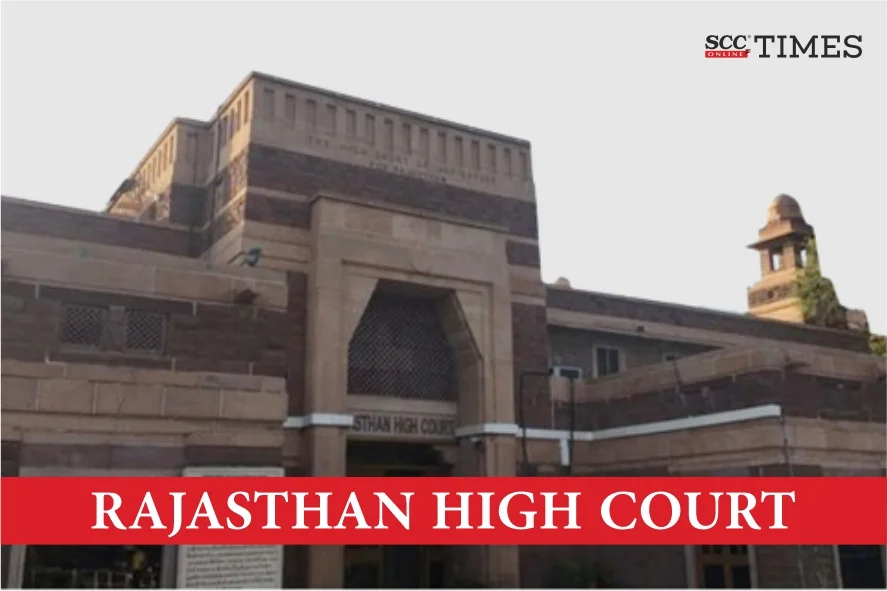Rajasthan High Court: In a Public Interest Litigation (PIL) filed by practicing advocates at the Gram Nyayalaya, Khokharia, Jodhpur, seeking cancellation of the No Objection Certificate (NOC) granted for setting up a Sewage Treatment Plant (STP) and for relocation of the STP from its proposed site adjacent to the Gram Nyayalaya, a Division Bench of Shree Chandrashekhar and Sandeep Shah,* JJ., dismissed the writ petition with direction to the State authorities to ensure strict compliance with environmental and operational safety standards.
The petitioners claimed that the land for the court was allocated in January 2011 and that the Gram Nyayalaya has been operational since 2017. According to petitioners, nearly 50 lawyers and a number of litigants attend the court daily. Later, the respondents decided to establish a 5 MLD capacity STP under the Rajasthan Urban Infrastructure Development Project (RUIDP) Phase-IV on Khasra No. 119, the same land parcel where the Gram Nyayalaya is situated. A notice inviting objections was published on 25-05-2022 and allotment was finalised on 02-06-2023.
The petitioners contended that the STP is only 30 metres from the Gram Nyayalaya, thereby posing health hazards due to potential bio-aerosol emissions and other environmental concerns. The petitioners placed reliance on international research indicating deterioration in quality of life near sewage plants and sought intervention on the ground that the STP would cause “forceful inhalation of bio-aerosols, which themselves contain allergy-causing micro-organisms”. It was contended that the State Sewage and Waste Water Policy, 2016, though not mandatory, promotes sanitation and hygiene in a way incompatible with siting an STP near a court.
However, the respondents contended that the petition is not maintainable as a PIL and involves policy decisions within the executive domain. It was contended that objections were invited via public notice, but the petitioners did not raise any objection at that stage and are therefore estopped from raising them now. It was contended that the STP will utilize Sequencing Batch Reactor (SBR) technology, which minimises odour and bio-aerosol emissions. Fine bubble diffusers will be used to further control emissions. It was stated that a 33% green belt will be created on the STP premises, and the operational units will be located at least 90 metres from the court premises.
The respondents further stated that the site was identified as early as 2013, following techno-feasibility studies and recommendations of the City Level Committee, and extensive investments (Rs. 70 crore approx.) have already been made in the sewerage infrastructure. It was stated that the Pollution Control Board has granted consent to operate the plant after examining all environmental laws, which has not been challenged by the petitioners.
The Court found that the land for the STP has been earmarked well before the Gram Nyayalaya building was constructed. The Court noted that “without taking proper care to identify the land for court building, the land was identified and court building has come up, which is in front of proposed STP.”
The Court noted that in view of the objection raised, the respondents proposed relocation of the STP approximately 204 metres away from the Gram Nyayalaya premises. The Court noted that the respondents has assured the Court that the relocated site would be equipped with advanced technology and safety measures including disinfection and environmental safeguards, and would be in compliance with applicable laws.
The Court emphasised that establishment of STPs is a matter of public interest and falls within the domain of executive policy.
“It hardly needs any reiteration that the establishment of the STP is in public interest and for the public good and some inconvenience at some stage may be caused to the nearby people, but the larger public good cannot be ignored for that reason.”
The Court held that it “cannot take over the executive function of the State, nor can the Court sit in appeal over each and every administrative decision.” The Court held that since the STP had now been relocated to a site 204 metres away from the court premises, “nothing further remains to be adjudicated in the present case.” The Court stated that the technology used and the green buffer zone would adequately address any residual concerns.
The Court dismissed the writ petition with direction to the State authorities to ensure strict compliance with environmental and operational safety standards.
[Rajendra Choudhary v. State of Rajasthan, 2025 SCC OnLine Raj 2535, Decided on 12-05-2025]
*Judgment by Justice Sandeep Shah
Advocates who appeared in this case:
Mr. CS Kotwani, Counsel for the Petitioner
Mr. Rajesh Panwar, AAG and Mr. Ayush Gehlot, AAAG, Counsel for the Respondents


